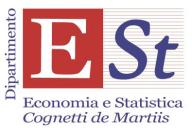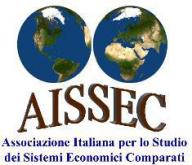By Piercarlo Frigero[*] and Xieshu Wang[†]
Introduction
The process of the poor becoming rich while the richest gets richer is challenged by sudden and unexpected events such as a global pandemic. Covid-19 is one of these events, and it shows why inequalities must be detected and described to reveal failures of development. It’s quite easy to think of economic growth as an itinerary described by macro-variables, even if it is well known that the path is not so smooth, and the dynamics are more complex. An evolving society develops some sort of contradiction while its national income grows: the destruction of traditional livelihoods, new types of poverty, even the threat of disappearance of its native people. All this may be accepted as the inevitable cost of its future wealth: when the richest gets richer, also some of the poor will become richer, although many would lag behind, surviving without opportunities of a real change. The spread of Covid-19 has challenged this vision of growth: the pandemic is not democratic, but danger and fear are, and so is the risk of a substantial reduction of growth rates, with the collapse of financial markets. The rich and the poor need to cooperate to avoid the worst.
Covid-19 in the context of complex social dynamics, system fragility and inequalities
Surely, the pandemic has been an unexpected and shocking event. We will debate for a long time about how and why it has spread faster and wider than most outbreaks in history. But it is easy to assess its role as a source of a sudden change in complex societies, what is sometimes called a catastrophic event. A catastrophe, according to complexity and catastrophe mathematical theory, is a discontinuity in the dynamic of a process: a sudden change of state in a system, due to the accumulation of factors that are not controlled over time and are suddenly released by a set of circumstances.
Our economic and political system, endowed with a good level of resilience, is however weakened by the complexity of local and international relations. This complexity has grown with globalization (international supply chains, the exchanges of goods, services and people) and it was suddenly exposed as the unexpected spread of the virus forced governments to block the movement of people and stop economic activities.
Fragility means a high probability of social instabilities: protests, or even riots, and the impossibility to enforce the necessary emergency laws. We define fragility as a high probability of failure of declared development objectives, induced by external events that provoke a slowdown.
Undesirable consequences might also arise from a high level of interdependence between formal and informal economy, and no clear lines between legal and illegal ownership, or employment and unemployment. To understand failures of development we must analyze the coexistence of areas of higher levels of welfare with areas of poverty or where survival is at risk.
Inequalities are the outcome of structural changes that destroy traditional technologies and their social relations, attracting people into big cities, replacing old professions with low salary and marginal jobs. To cope with the pandemic, we have to endorse an ethical choice in the very concept of growth: fighting poverty and pursuing development goals are fundamental values grounded in a consensus about human rights, or only a device to preserve social stability?
In what follows, we describe vulnerable groups of people facing Covid-19 in poor and emerging countries, especially the indigenous peoples. The aim is to suggest how the pandemic may interact with inequalities provoked by unsuccessful growth-oriented policies.
Ethnic minorities and indigenous people: a centuries-long tragedy
In some places groups of indigenous people have never been involved with the newly emerging economic and social system. The native people are anchored to their ancient traditions and sometimes the involvement with the prevailing modernity represents a danger for their physical lives, as experienced in previous years, with diseases far less deadly than Covid-19. Unfortunately, it is easy to treat them as mere residuals of history, to be involved or destroyed, no matter if involvement will lead to destruction.
In Amazonia, saving the rainforest is perceived as one of the main targets of environmental protection, but it means more than avoiding deforestation. The lives of several ethnic groups are endangered by the contradictions of economic growth. On the stage of a fascinating ecosystem, a centuries-long tragedy takes place: natives are threatened by growth-oriented initiatives that destroy traditional livelihoods, subsistence, and sometimes life itself. The change continues with the arrivals of other people in search of profitable activities. Unfortunately, they are only able to exploit short term opportunities, while destroying useful long-term resources. In that context, the pandemic is a threat already experienced several times by the indigenous peoples in history. We have witnessed it before Covid-19, with the conflict between Garimpeiros (illegal gold miners) and natives. Yanomami, in the state of Roraima (Brazil), were already decimated by less dangerous epidemics during the last century. Paradoxically, in the present pandemic, the main concern is not the absolute number of affected or dead individuals, but the weakness of communities to take counter and contain measures, when a catastrophic event adds to an already devastating process of economic and social change. Indigenous people have different degrees of integration. Some benefit from useful type of relations with the so-called modernity, i.e. access to some education and health services. Development agencies and non-profit organizations are working on inclusion and technological advancement for better labor productivity and a more sustainable use of natural resources. All that requires time, but Covid-19 cannot wait. Trained and untrained are affected, and leaders of a sustainable development are too precious to be left to die. Now Covid-19 endangers long lasting projects of social inclusion.
Forest people named the pandemic “Xawara” and in the past they reacted by old wisdom and instinct: they retired into the forest, very far from dangerous interactions with the modern world. Facing the Covid-19, the Karen people of Thailand followed their ancient ritual of “Kroh Yee” (village closure); other spontaneous cases of lockdown are reported in Malaysia and Bangladesh (UN Department of Economic and Social Affairs, 2020). These are examples of traditional lockdown, but they also mean the renouncement to potential health assistance and returning to the forest without the certainty of not having been infected.
Meanwhile, other problems and threats also arise from the Covid-19 and the consequent lockdown, such as food insecurity, breakdown of informal economy and seasonal work. This has happened to the Maasai in Kenya, who suffered from the closure of livestock markets which led to the collapse of the local pastoral production system (Wight, 2020).
The indigenous Batwa is a forest hunter-gatherer group spread throughout Burundi, Rwanda, Uganda and DRC; traditionally, they were deeply rooted in the forests of the Great Lakes region from where they derived their identity and culture as well as their source of livelihood and medicines (Olembo, 2020). However, in the last century, a majority of the Batwa people were chased from their ancestral land due to colonialization, civil wars and deforestation. As a result, many of them now live in a poor status and have to do precarious jobs such as washing, cleaning and carrying garbage to just survive. With the Covid-19 lockdown, they are prevented from leaving their homes to look for food or work and have to depend on the government and NGOs to get food relief in form of maize flour, beans and soap. But this is not a sufficient solution to help them build a sustainable way of life during and after the pandemic (United Organisation for Batwa Development in Uganda, 2020).
Indigenous communities are in a precarious equilibrium between tradition and change, with undernutrition, lack of clean water, poor access to healthcare. All that might contribute to higher morbidity and mortality rates. The UN stresses that the future of an already difficult sustainable integration is further endangered by the risk of death of leaders and elders in the indigenous zones, as the elders “are the last custodians of traditional knowledge, leading community governance, gatherings and ceremonies” (UN Department of Economic and Social Affairs, 2020).
Urbanization and slums
Meanwhile, Covid-19 reveals the implications of some phenomena that are considered unavoidable consequences of the difficulty to manage the very complex economic dynamics in our days. One of them is urbanization, which heavily contributes to the spreading of the pandemic. Mexico City became an epicenter in Latin America while New Delhi and Mumbai were heavily hit in India. The cities’ over-expansion, in Africa, Asia and Latin America, is an example of structural disequilibrium, with theirs slums, barrios or favelas. An unexpected event, as the pandemic, so pervasive and dangerous, reveals them as unsustainable contradictions, if sustainable development is to be pursued.
In Kenya, the slum of Korogocho is an example of poverties at the most dramatic level. Close to a large and polluted landfill, people try to survive through day to day activities without opportunities for the future. It is clear that restrictions on behavior and lifestyle are beyond the capabilities of local enforcement. In places like that, the individual concern is not the virus but hunger, and the priority is how to avoid starvation, more than how to escape from the only recently appeared disease (Floris, 2020).
In New Delhi’s landfill, poor people sift through garbage to gain their livelihood, and have no choice: if they stay they will die either from hunger or from the virus. Then, so many of them returned to their villages, thus further spreading Covid-19. Amnesty International reports that in Addis Ababa, Ethiopia, after the demolition of illegal settlements by public authorities many families are now at risk of infection, without having even basic shelter (Amnesty International, 2020).
In Brazil, 13 million people live in informal settlements in the favelas, where the State is almost absent, and the pandemic is tackled with forms of self-organization: they “monitor local health, find ambulances and doctors, produce masks, distribute hygiene kits and groceries, and set up interim sick wards to isolate people tested positive”; it is likely that the local gangs have also contributed to impose social-distancing restrictions (Eisele, 2020).
Formal versus informal economy
There is a photo, one of the many images published during the lockdown, showing the conflict between official statements and attempts to survive through day to day activities. A policeman is trying to enforce legal restrictions, facing a mother trying to sell goods in a marketplace, while holding her baby close to herself (Internazionale, 2020).
Everywhere, but particularly in poor countries, the effects of lockdown severely hit the informal economy, defined by ILO as the set of economic relations non-covered with formal arrangements. Informal jobs consist of street vendors, domestic workers, taxi drivers, home delivery workers, waste pickers and recyclers, transport and construction workers, and many more including small peasants in rural or suburban areas, and migrant workers (ILO, 2020). They are difficult to protect from the Covid-19 crisis with insufficient public subsidies and financial support.
Informal employment is the main source of employment in Africa, accounting for 85.8% of total employment; while in developing Asia, this figure, including agriculture, is 71.4% and in Americas 53.8% (ILO, 2018). One typical form is the so-called Bazar economy: a network of small daily exchanges, which implies a great number of social interactions and contacts. As noted by ILO: “dependence on the informal economy means not being able to afford to be under total quarantine” (ILO, 2020).
A simple case of a family illustrates this fact (Lafuente et País, 2020). A mother and her young son cooked breakfast and lunch every day, and sold the food on the street to the children of a school in the neighborhood of Mexico City. When lockdown was imposed, they did not even know what happened but had to stay at home, without any source of income, waiting for the run out of their savings. As shown by this case, informal economy is a network of simple relations. In this type of economy, a link (e.g. selling to pupils at school in the neighborhood) might be substituted by another; what cannot be done is avoiding relations between people.
The situation of migrants may be even worse. Nicaraguan laborers cross the border with Costa Rica and work illegally and in poor conditions on local farms. When some of them were tested at the border and found to be positive, Costa Rica has blamed them for bringing the pandemic into the Country (DW, 2020).
Conclusion: learning from Covid-19
Two main lessons shall follow the pandemic experience: the relevance of a system of social protection (quite obviously) and the notion of democracy as partnership between all groups of people sharing the common intent of improving welfare.
Facing the spread of the disease, it was clear that everyone’s health is linked to the health of others. Unfortunately, benefits and costs of the restrictions are distributed in unequal measures, and many groups have to rely on governments to regain some level of fairness. Covid-19 stressed everywhere the relevance of public healthcare and efficient education system. Both are instruments of social protection and progress, and can be used properly to reduce inequalities and enhance capabilities of the poorest.
An early warning system requires democracy. Free press, radio and television, and also the proper use of the web, might be a guarantee against fake news. Mostly important is the free and effective communication between scientists and healthcare professionals to process information and take timely decisions. In the fast spread of pandemic, time equals life.
The ILO experience has shown that social dialogue is more critical than ever at the time of Covid-19. “Social dialogue refers to all types of negotiation, consultation or information sharing among representatives of governments, employers and workers, on issues of common interest” (ILO, 2020). In informal activities, efforts may be done to organize groups with the common interest to maintain their jobs and stop the pandemic. What happened spontaneously in some communities is a proof of relevance of self-organization. All that shapes a network of relations, inside the social system and outside, for a useful partnership between states, governments, and international institutions.
While the nations with better welfare system have the capacity to put into place stimulus programs, the emerging economies and poor regions face risks of all kinds. An easy solution is not obvious, since there are already many contradictions caused by the economic growth and inequalities. More inclusive programs and collaborations to help and assist people in precarious situation, in particular those with limited access to modern health service and weak economic stability, are needed to build together a stronger defense against the pandemic. After all, the pandemic concerns everyone living on this globe, as we are more than ever connected to each other.
References
Eisele, I. (2020). Brazil's favelas forced to fight coronavirus alone. DW, 2 July, 2020. www.dw.com/en/brazils-favelas-forced-to-fight-coronavirus-alone/a-54031886
Floris, F. (2020). African cities are growing, but development stagnates. Il Manifesto, global edition, 17 July 2020.
Lafuente, J. and País, E. (2020). Internazionale, 13 May, 2020. www.internazionale.it/notizie/javier-lafuente/2020/05/13/messico-virus-terremoto
Olembo, E. (2020). Overlooked no more: A Victory for the Indigenous Batwa of the Democratic Republic of Congo. Minority Group Rights International,16 June, 2020. undefined
Wight, A. (2020). The Coronavirus Pandemic is causing Kenya’s Maasai to change its ancient habits. Forbes. 5 April, 2020. undefined
Amnesty International (2020). Ethiopia: Forced evictions in Addis Ababa render jobless workers homeless amid COVID-19. 29 April, 2020. www.amnesty.org/en/latest/news/2020/04/ethiopia-forced-evictions-in-addis-ababa-render-jobless-workers-homeless-amid-covid19/
DW (2020). COVID-19 deals further blow to Nicaraguan migrant workers. Video. 3 August, 2020. undefined
ILO (2018). Women and men in the informal economy: a statistical picture (third edition). International Labour Office, Geneva, 2018. undefined
ILO (2020). The impact of the COVID-19 on the informal economy in Africa and the related policy responses. ILO Brief, 14 April, 2020. undefined
Internazionale, 26 June/2 July 2020, n. 1364 year 27, photo by Rodrigo Abd (Ap/Lapresse)
UN Department of Economic and Social Affairs (2020). The Impact of COVID-19 on Indigenous Peoples, Policy Brief No.70, May 2020. www.un.org/development/desa/dpad/wp-content/uploads/sites/45/publication/PB_70.pdf
United Organisation for Batwa Development in Uganda (2020). Increased hunger and poverty among the Batwa amidst COVID-19 in Uganda. Forest Peoples Programme, 7 May, 2020. www.forestpeoples.org/en/increased-hunger-and-poverty-for-Batwa-in-Uganda-amid-covid-19
[*] Piercarlo Frigero was Professor of Applied Economics at University of Turin
[†] Xieshu Wang is Associate Researcher at CEPN, University Sorbonne Paris Nord, and Research Fellow at OEET, University of Turin









